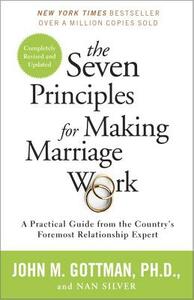Take a photo of a barcode or cover
Key takeaways:
-happy marriages are based on deep friendship and admiration that are built in little ways
-use a "soft start up" when communicating a complaint and make it specific to the situation
-when your partner is in pain, the world stops and you focus on them (even if they are blaming you)
-when there is a conflict between your mother and your wife, you must side with your wife
-when you disagree on something, make sure you look for the overlap where you can compromise
-keep turning towards your partner when they make "bids" and stay engaged
Potential limitations:
-doesn't address in depth what to do if you have an ongoing conflict where each stance is non-negotiable for each partner
Next action:
-Create weekly date ritual to stay connected
-happy marriages are based on deep friendship and admiration that are built in little ways
-use a "soft start up" when communicating a complaint and make it specific to the situation
-when your partner is in pain, the world stops and you focus on them (even if they are blaming you)
-when there is a conflict between your mother and your wife, you must side with your wife
-when you disagree on something, make sure you look for the overlap where you can compromise
-keep turning towards your partner when they make "bids" and stay engaged
Potential limitations:
-doesn't address in depth what to do if you have an ongoing conflict where each stance is non-negotiable for each partner
Next action:
-Create weekly date ritual to stay connected
I probably shouldn't rate self-help books; I don't like the genre. In my defense, I wasn't expecting this to be such a typical self-help book. I know of John Gottman from his research referenced in other books (Malcolm Gladwell and others), so I thought that his book would go more into the science and the findings of his lab. Instead, it was basically a therapist's marriage class in book form. There were a lot of quizzes and handouts and exercises. The few times it used statistics it did so in a really annoying way, overly specific numbers with vague ideas, "I have found that 67% of couples feel this way," etc. That said, the advice seems solid enough, and I appreciate that it presents couples' differences of opinion with a neutral, nonjudgmental stance on issues such as money, children, religion, and values. It was quite heteronormative, another thing that disappointed me since I know Gottman has done research on gay and lesbian couples. Advice was given with the assumption that the reader(s) are a husband-wife pair and gender/role specific advice is given ("it is usually the wife who...")
informative
slow-paced
hopeful
informative
reflective
fast-paced
challenging
funny
hopeful
informative
inspiring
slow-paced
informative
reflective
fast-paced
caveat 1: I didn’t do any of the exercises
caveat 2: no book on marriage will take the place of having a good individual and/or couples therapist
having said that, this is one of the more sound books of the subject I’ve come across.
caveat 2: no book on marriage will take the place of having a good individual and/or couples therapist
having said that, this is one of the more sound books of the subject I’ve come across.
This book reads like intro to therapy concepts for (perhaps ideally boomer) heterosexual couples. The activities seem to be the best and most useful aspect, while I found many of the rationalizations for why (cisgender, heterosexual) men and women behave the way they do to be reductionist, regressive and old-school (for example, claiming the reason girls play family-centered games and have pretend weddings as kids is due to biology... really?). I enjoyed listening to add perspective to relationship problem solving, and I will reiterate I think the activities seemed like good structured way to build relationship strength (or manage conflict resolution), but I would caution this to be used in conjunction with other more progressive perspectives, tools and methods.
slow-paced
I really liked the start of the book, and how scientific the findings seemed to be.
However, the book was boring to read, and I felt a like it was disorganized. I think a first chapter going over the 7 principles, and then chapters on examples on how useful they can be, and then the exercises would be better.
Maybe as a manual to follow, and not sequentially, it can be good. But as a book to read to learn more about the subject, it drags.
I also felt some of the principles were derivable from others. Basically the important ones, were fewer, and much simpler.
It was nice to read, I liked what I learned. But it took too long and I had to sift through a lot
Edit - 7 oct 2020
Changed rating from 2 to 4 stars
I'm reading "love is never enough" and I'm realizing this book is much better than I realized. Even though my complaints remain, repetitiveness and there were too many questionaires in the middle of the book, I think the initial information was very useful and very insightful, much better than the "love is never enough" is being so far.
However, the book was boring to read, and I felt a like it was disorganized. I think a first chapter going over the 7 principles, and then chapters on examples on how useful they can be, and then the exercises would be better.
Maybe as a manual to follow, and not sequentially, it can be good. But as a book to read to learn more about the subject, it drags.
I also felt some of the principles were derivable from others. Basically the important ones, were fewer, and much simpler.
It was nice to read, I liked what I learned. But it took too long and I had to sift through a lot
Edit - 7 oct 2020
Changed rating from 2 to 4 stars
I'm reading "love is never enough" and I'm realizing this book is much better than I realized. Even though my complaints remain, repetitiveness and there were too many questionaires in the middle of the book, I think the initial information was very useful and very insightful, much better than the "love is never enough" is being so far.





